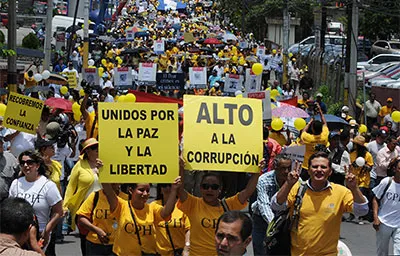On May 25, the Honduran press corps took to the streets of Tegucigalpa and four other cities to reject the growing levels of violence against members of the media. Many marchers donned yellow-and-black t-shirts emblazoned with the words: “Killing journalists will not kill the truth.”
It was an impressive show of solidarity but in the aftermath, a question hung in the air: what took them so long? Though the pace of attacks and killings of reporters picked up dramatically after a 2009 coup ousted the country’s president, last month’s march was the first nationwide protest by journalists.
Due to political and drug-related violence as well as widespread impunity, Honduras, a nation of 7.5 million people, is one of the most dangerous countries in the region for journalists, CPJ research shows. At least 14 journalists have been killed since President Porfirio Lobo took office in January 2010. The systematic failure of Honduran authorities to investigate these crimes has frustrated any attempt to solve the murders, CPJ said in a letter sent to Lobo in December.
The climate is so intimidating that reporters told CPJ that they don’t dare probe deeply into crucial issues like drug trafficking or government corruption. Many print reporters have removed their bylines from their stories. Tiempo, a San Pedro Sula-based daily newspaper that consistently criticizes the government, has shut down its investigative unit due to safety concerns. Some reporters claim the only safe way to tell the truth about Honduras is to write a novel.
“Everyone feels vulnerable,” said Mavis Cruz, director of the news program Noticias a la Hora on Radio Libertad in San Pedro Sula. “There have been so many abuses against journalists and there is almost total impunity.” But rather than coming together to face this crisis, Honduran journalists are deeply divided and suspicious of one another.
Besides damaging the country’s democracy, the June 2009 military-backed coup that ousted leftist former President Manuel Zelaya fractured the national press corps into opposing camps, according to Juan Carlos Rodríguez, a general assignment reporter for Tiempo in San Pedro Sula.
Journalists in favor of the coup or who work for media outlets that supported Zelaya’s ouster are known in Spanish as golpistas or “coup-backers,” while those who opposed it have been pigeon-holed as resistencia, or part of the political resistance.
Rodríguez says that when “resistance” journalists are attacked or killed, the news receives scant attention or comment from pro-coup media–which includes most of the country’s major television, radio, and print outlets.
By contrast, the May 15 killing of Ángel Alfredo Villatoro, a prominent radio host and close friend of President Lobo, has been headline news for days. Indeed, it was the killing of Villatoro, one of the country’s best-known journalists, which prompted the Honduran press corps to temporarily set aside its differences and stage the May 25 nationwide protest, according to Karina Interiano, who anchors the Noti6 TV news program on Channel 6 in San Pedro Sula. Journalists in Tegucigalpa did participate in a smaller march in December after the murder of reporter Luz Marina Paz Villalobos. They were beaten and tear-gassed by soldiers and police, according to press reports.
Honduras is one of the world’s most violent countries. A 2011 United Nations report found it has the world’s highest per capita homicide rate, with 82.1 murders per every 100,000 inhabitants.
As CPJ noted in its Journalist Security Guide released this year, professional solidarity is important in situations in which local journalists face sustained risk. “Perhaps the best step journalists can take in such environments is organizing themselves first in their newsroom, then with other journalists and news organizations within their city or region, and ultimately across their nation,” the guide states. Groups such as Colombia’s Foundation for a Free Press and the Brazilian Association for Investigative Reporting have played valuable roles in curbing attacks on journalists.
In Honduras, adding to the mutual suspicion among reporters is the fear that they are being spied on by colleagues who may be passing information to security forces. These journalist/informants are known locally as orejas, Spanish for “ears.” The scenario is especially chilling because many reporters believe that some of the attacks on journalists have taken place with the tacit approval or complicity of the country’s police and military.
“Lots of journalists are corrupt and receive payoffs,” Cruz said. As she spoke in a hotel restaurant, a reporter suddenly approached the table, uninvited, to greet her. Later, Cruz whispered that the reporter probably doubled as an informant.
These tensions add to the regional rivalries that have long existed between reporters in Tegucigalpa, the capital, and those based in San Pedro Sula, the country’s industrial center and largest city. Even within news organizations, there’s often a lack of solidarity, reporters told CPJ.
Rubén Escobar, an editor at Tiempo in San Pedro Sula, told CPJ that his supervisors have failed to hold a single meeting to discuss the deteriorating security situation and have neglected to provide any guidance or training to help reporters protect themselves. “I have taken some courses in personal security but I did that myself,” Escobar told CPJ.
And trying to bring rival reporters together to work out their differences is getting more difficult due to the spiraling violence. Escobar said that reporters in San Pedro Sula rarely meet after work for drinks or dinner anymore because that could expose them to shootouts between gang members or drug lords. “These days if I want to have a few beers I buy them at the supermarket and bring them home,” he said.
[Reporting from San Pedro Sula, Honduras]
